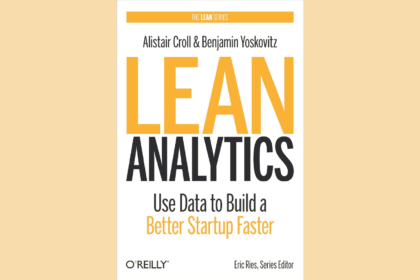
In the fast-paced world of startups, data can either be your best friend or your worst enemy. Many founders mistakenly focus on scaling before figuring out what truly works for their business model.
With companies burning through cash faster than ever, there’s a question looming on every entrepreneur’s mind: How can I grow my startup faster without wasting resources? This is exactly where “Lean Analytics” by Alistair Croll and Benjamin Yoskovitz comes in.
Book Overview
Lean Analytics is a must-read for startup founders looking to drive growth by making data-driven decisions. Written by Alistair Croll and Benjamin Yoskovitz, this book is part of the Lean Startup movement popularized by Eric Ries, but with a specific focus on analytics.
In a world where data can overwhelm even the most seasoned founders, Lean Analytics teaches startups to focus on the metrics that truly matter.
Summary
The book revolves around the idea that you don’t need all the data—you need the right data. Founders often get lost in the ocean of metrics, but Croll and Yoskovitz simplify things by identifying one key concept: “The One Metric That Matters” (OMTM). This is the single most important metric that, if improved, will have the most significant impact on your business at any given stage.
The authors break down startup growth into different phases—empathy, stickiness, virality, revenue, and scale—and show how analytics should evolve at each stage. Each phase comes with specific goals and key metrics that a startup founder must focus on to avoid spreading themselves too thin.
Key Lessons
– Focus on One Metric That Matters (OMTM): Instead of tracking everything, startups should concentrate on improving just one key metric at a time.
– Define Stages of Growth: Different phases of a startup’s life demand different metrics. Whether you’re validating an idea or trying to scale, your focus will change.
– Data-Driven Decision Making: Instinct and intuition can only take you so far. For startups, data-driven decision-making is the difference between efficient scaling and wasting time and resources.
– Avoid Vanity Metrics: Founders often get distracted by metrics that make them look good but don’t drive the business forward—like social media followers or website hits. Focus on actionable data.
– Run Experiments: Don’t just rely on big data; small experiments can give you valuable insights. Startups should validate assumptions with real-world tests before committing resources to a particular strategy.
Quotes
– “Data is the sword of the 21st century, those who wield it well, the samurai.”
– “The goal of Lean Analytics is not to measure everything, but to focus on the one key metric that will drive your startup forward.”
– “Startups live and die by their assumptions, and the faster you validate or disprove them, the faster you grow.”
Practical Applications
– Early Validation: If you’re just starting, you might assume there’s a market for your product. Instead of building the product first, run small surveys, landing pages, or crowdfunding campaigns to gauge interest.
– Pivoting with Confidence: If your key metric isn’t showing signs of growth, you know it’s time to pivot. *Lean Analytics* gives you the tools to detect when you should pivot and how to do so efficiently.
– Revenue Models: For startups in the revenue phase, the book suggests tracking customer lifetime value (CLV) and customer acquisition cost (CAC). By understanding how much each customer is worth compared to what it costs to acquire them, startups can make informed decisions about scaling.
Strengths
– Actionable Frameworks: The book offers practical advice for founders at every stage of their startup journey. Each phase comes with specific metrics, making it easy to apply to real-world scenarios.
– Simplicity in Data: The concept of focusing on one metric makes analytics approachable, even for non-technical founders. You don’t need to be a data scientist to apply the lessons in this book.
– Covers All Phases of Growth: Whether you’re just starting with an MVP (Minimum Viable Product) or scaling to a global audience, *Lean Analytics* provides frameworks for every stage of a startup.
Weaknesses
– Too Simplistic for Some Industries: Some founders argue that the book’s examples and focus are too narrow, particularly for startups in highly regulated industries like healthcare or fintech. In these sectors, the key metrics are often more complex than the OMTM approach suggests.
– Lack of Deep Case Studies: While the book provides plenty of examples, some readers may feel that the case studies don’t go deep enough into how larger startups use these methods.
Questions for You
– What are the most significant assumptions in your current business idea that need validation through data?
– Which type of experiment or metric would be the most suitable for your startup’s current stage, and why?
– How can you avoid falling into the trap of vanity metrics that may look impressive but offer no real value to your startup’s growth?

Join Our Founder Network
Are you ready to apply the insights from Lean Analytics to your own startup? Join our Founder Network today and connect with other like-minded entrepreneurs who are also navigating the challenging waters of early-stage growth.
By joining, you’ll receive expert guidance, access to exclusive content, and the opportunity to collaborate with founders who are just as focused on data-driven growth as you are.



